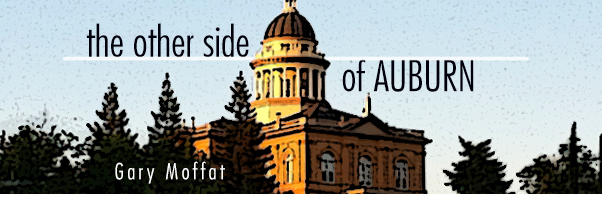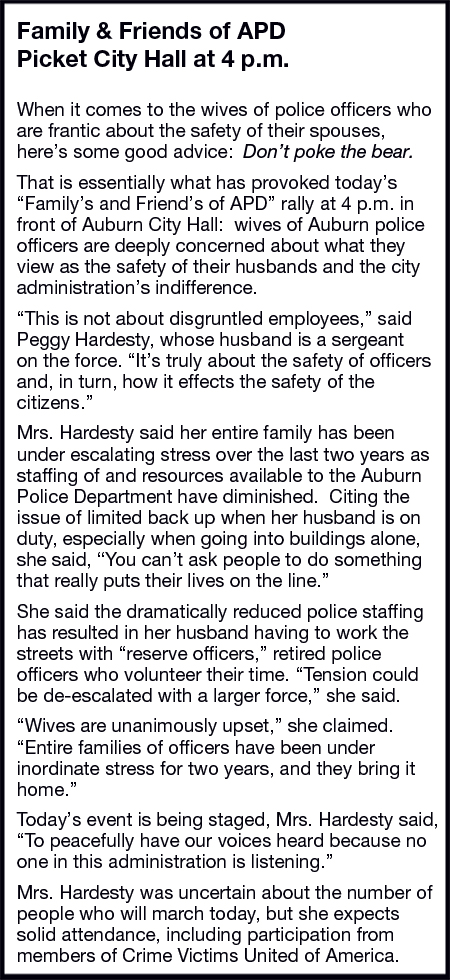The Aftermath: Part II of Inside Auburn P.D
(Note: I’m tapping in to the Carpe Vino email list as a means of expediently launching my blog site. You will receive no further direct emails of The Other Side of Auburn unless you opt-in by clicking here. I will post notices of future blog posts in Window on Old Town, but only those who request to be on the list will receive posts directly. Also, please understand that these views are wholly my own. Thanks! –gary)
The Aftermath:
Part II of Inside Auburn P.D.
In the first part of Inside Auburn P.D. (click here to read), I revealed—based on interviews with five confidential department sources—how the Auburn Police Department staffing has been decimated by 40% compared to pre-economic downturn levels, resulting in potential patrol back-up issues as well as limited coverage Monday through Thursday nights when only two officers are on duty.
Specific, critical positions that have been virtually abandoned or dramatically curtailed include traffic enforcement, school resources officers and DUI enforcement. The S.W.A.T. team is gone, as is the canine officer and even the Neighborhood Watch program. My sources painted a bleak picture of a department whose basic communications and computer systems are antiquated. The result is, they say, a policing organization that is understaffed and ill equipped to provide the minimum level of services necessary to protect the community and themselves.
This situation has resulted in a patrol force under increased stress on the street and at home when they return to families deeply worried about the safety of their loved ones while on the job. Wives are so concerned about the situation, they have organized a rally of “families and friends of APD” who will march in front of the Auburn City Hall this afternoon (November 21) at 4 p.m. to bring attention to this escalating issue (see sidebar).
I wrote my original piece as an opinion column for the Auburn Journal where my work had run every Friday, beginning in May and ending on September 26. Frequency of my column had been cut to once per month, based on an edict from the Auburn Journal’s corporate office in San Diego (the newspaper is part of Gold Country Media, owned by Brehm Communications). The decision came directly from Vice President and General Manager Tom Taylor, a former publisher of the Auburn Journal. Taylor’s order: no more non-staff weekly columns, of which there were two: mine and one written by Chamber of Commerce CEO and Auburn City Council member, Kevin “Two Hats” Hanley.
Clearly, the change was aimed squarely at me because of my damning columns about the Chamber’s move to a new headquarters building with space provided compliments of the Auburn City Council. You just don’t challenge the Chamber and expect to get away with it for long. Plus I wrote a column critical of Rep. Tom McClintock’s idea to dismantle the Veteran’s Administration’s health care network. You don’t dis Tom in this town, where his staunchly conservative political ideals are revered.
So, down to just a single opportunity per month, I was determined to solider on. When insiders approached me with details about the degradation of services within the APD, I jumped on it. This was an important story that needed to be told, and it was something that I knew instinctively the Journal would be reluctant to publish.
I submitted the piece early on October 20, two days ahead of my Wednesday deadline for Friday publication. I heard nothing from the staff, so it was clear that my story revealing the untenable situation at APD would not run. That same Friday—October 24—Marcelo Marquez went on a killing rampage that ended on the streets of Auburn.
Out of town on a hunting trip to South Dakota, I followed the story streaming live online. On my return and over the next three weeks, I met with the Journal’s editor, who agreed that the story did, indeed, “have legs”. His concern was my column had too much hard news content to run as an opinion piece. Also, he wanted to report the other side and get reactions from the police and city management.
His plan was to assign a reporter to further develop the story and run it on the front page with a dual byline, including my name. Though I was reluctant to relinquish ownership of the story, I agreed with his thinking, and more importantly, I trusted him. My overriding motivation was to make sure this very important story was made public.
In the days that followed, both the editor and his reporter met with the police chief and discussed the story with the city manager. I was not informed of specifics details, but the city administration pushed back hard in denying the charges outlined in the story. The newspaper was told the story was concocted as a bargaining tool by the patrol officers union, currently in contract negotiations with the city.
Development of the story came to a screeching halt for two reasons: After being contacted by the newspaper, my sources tell me the police chief met individually with officers in an attempt to find out who was feeding the story to me. This is exactly what my sources feared. . .that there would be retribution within the department. The result was several of my sources, fearing for their jobs, clammed up.
Equally devastating was the fact that the Auburn Journal editor demanded that my sources go on the record with their charges or the newspaper would not move forward. Predictably, they declined, and the story skidded to a halt. “We don’t do that kind of journalism,” was the newspaper’s rationale for not continuing—that is attributing information to unnamed sources.
At the same time, the Journal’s staff told me that they were continuing to try and develop the story. When I insisted that after three weeks the story was going cold quickly and pressed for a timeframe for publication, I was told the newspaper would not be pressured into making a commitment. It was clear to me at that moment that the story—as far as the Journal was concerned—was dead.
My sense, and I have no way of proving it, was that the editorial staff was directed to drop the story through another order from its corporate headquarters.
The only course of action left was to find other news outlets that would find the story of interest. I distributed the column to friends with Sacramento media contacts, and Fox 40 jumped on the story.
I had already determined to re-launch my column as a blog and had written an introduction to my original column explaining why I was going solo. When I learned that Fox 40 was broadcasting their story on November 13, I was not going to be scooped on my own story, so I published it to the Carpe Vino customer email list at 12:30 that day.
Televised news stories ran at 5, 6 and 10 p.m. (Click here for story); an early report focused on another damning fact—that SR15 semi-automatic rifles used by the Auburn Police Department were in a locked storage cabinet during the Marquez rampage on October 24, unavailable for use by off-duty officers who returned to assist. Later reports were much more detailed.
So far, the Journal continues to remain mute.
For the Record. . .
Since I am not employed as a newspaper reporter, it would be reasonable for readers to wonder exactly how I gained access to information about what is going on behind the locked gates of the Auburn Police Department.
Two years ago, I ran for a seat on the Auburn City Council. In what was a very contentious race—in which my two incumbent opponents tied 38 votes ahead of me with nearly 10,000 votes cast for two seats—the big upside of the experience was creating a bond with the rank and file of the APD. I was the only candidate endorsed by the Auburn Police Officer’s Association as well as the Auburn FD Association and Placer County Sherriff’s Association. Throughout my campaign, one officer in particular worked very hard on my behalf.
I’ve stayed in close touch and I have developed a high level of trust with a number of officers. Some were willing to confide in me for this story or it would not have happened.
I have a track record for challenging the city on its close ties with the chamber and the undue influence the chamber wields in political outcomes in Auburn. I have pointed out extreme conflicts of interest and what I observe to be improper uses of city funds benefitting the chamber.
If you are interested, search the Auburn Journal web site to read my past columns.
In short, I am personally offended by what I view as abuses of power, and I am happy to write about it. Look for more in future blog posts. Click here to be added to my opt-in list.
Next Time:
Insight into how the Auburn City Council’s “performance-based budgeting” lead directly to the gutting of the police department. Also, a comparison of how the Auburn Police Department stacks up compared to other jurisdictions in terms of staffing levels and area served.


